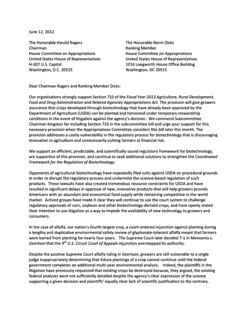A long list of agricultural corporations wrote a letter thanking Jack Kingson (R GA-01) for working to get the Monsanto rider into the 2013 Ag. bill:
Again, we commend Subcommittee Chairman Kingston’s efforts and urge the support of Section 733 in the Fiscal Year 2013 Agriculture, Rural Development, Food and Drug Administration and Related Agencies Appropriations Act.
 This letter is on
Monsanto’s own website.
It contains not one word about public health or quality of food or preservation of farmers who do not choose to
poison people the Monsanto way.
The glyphosate mentioned in the letter is the principal ingredient in Roundup, and
This letter is on
Monsanto’s own website.
It contains not one word about public health or quality of food or preservation of farmers who do not choose to
poison people the Monsanto way.
The glyphosate mentioned in the letter is the principal ingredient in Roundup, and
 research shows it causes DNA damage even when vastly diluted.
Monsanto’s glyphosate-resistant crops are genetically modified to include a gene which produces a poison that
other research indicates is toxic to humans.
These poisons are what the Monsanto rider makes harder to get out of fields.
research shows it causes DNA damage even when vastly diluted.
Monsanto’s glyphosate-resistant crops are genetically modified to include a gene which produces a poison that
other research indicates is toxic to humans.
These poisons are what the Monsanto rider makes harder to get out of fields.
June 12, 2012
The Honorable Harold Rogers
Chairman
House Committee on Appropriations
United States House of Representatives
H‐307 U.S. Capitol
Washington, D.C. 20515The Honorable Norm Dicks
Ranking Member
House Committee on Appropriations
United States House of Representatives
1016 Longworth House Office Building
Washington, DC 20515Dear Chairman Rogers and Ranking Member Dicks:
Our organizations strongly support Section 733 of the Fiscal Year 2013 Agriculture, Rural Development, Food and Drug Administration and Related Agencies Appropriations Act. The provision will give growers assurance that crops developed through biotechnology that have already been approved by the Department of Agriculture (USDA) can be planted and harvested under temporary stewardship conditions in the event of litigation against the agency’s decision. We commend Subcommittee Chairman Kingston for including Section 733 in the subcommittee bill and urge your support for this necessary provision when the Appropriations Committee considers this bill later this month. The provision addresses a costly vulnerability in the regulatory process for biotechnology that is discouraging innovation in agriculture and unnecessarily putting farmers at financial risk.
We support an efficient, predictable, and scientifically sound regulatory framework for biotechnology, are supportive of this provision, and continue to seek additional solutions to strengthen the Coordinated Framework for the Regulation of Biotechnology.
Opponents of agricultural biotechnology have repeatedly filed suits against USDA on procedural grounds in order to disrupt the regulatory process and undermine the science-based regulation of such products. These lawsuits have also created tremendous resource constraints for USDA and have resulted in significant delays in approval of new, innovative products that will help growers provide Americans with an abundant and economical food supply while remaining competitive in the world market. Activist groups have made it clear they will continue to use the court system to challenge regulatory approvals of corn, soybean and other biotechnology-derived crops, and have openly stated their intention to use litigation as a way to impede the availability of new technology to growers and consumers.
In the case of alfalfa, our nation’s fourth largest crop, a court-ordered injunction against planting during a lengthy and duplicative environmental safety review of glyphosate-tolerant alfalfa meant that farmers were barred from planting for nearly four years. The Supreme Court later decided 7-1 in Monsanto v. Geertson that the 9th U.S. Circuit Court of Appeals injunction overstepped its authority.
Despite the positive Supreme Court alfalfa ruling in Geertson, growers are still vulnerable to a single judge inappropriately determining that future plantings of a crop cannot continue until the federal government completes an additional multi-year environmental analysis. Indeed, the plaintiffs in the litigation have previously requested that existing crops be destroyed because, they argued, the existing federal analyses were not sufficiently detailed despite the agency’s clear expression of the science supporting a given decision and plaintiffs’ equally clear lack of scientific justification to the contrary.
The language in Section 733 maintains the ability of growers to continue to grow previously de-regulated crops while giving the Secretary of Agriculture the authority to impose immediate interim measures if a judge rules that a “deregulation” determination was not properly granted for a biotechnology-derived crop. Such interim measures have previously been imposed by USDA for glyphosate-tolerant sugarbeets in 2011, but even those interim measures for sugarbeets are now being litigated. The language ensures growers can continue planting and cultivating their crops — with appropriate interim conditions — while disputes about the sufficiency of federal analysis and paperwork continue.
Section 733 provides certainty to growers with respect to their planting decisions. If enacted, growers would be assured that the crops they plant could continue to be grown, subject to appropriate interim conditions, even after a judicial ruling against USDA. Moreover, the language would apply only to products that have already satisfactorily completed the U.S. regulatory review process and does not remove or restrict anyone’s right to challenge USDA once a determination of no plant pest risk has been made.
The inclusion of Section 733 is a positive step to ensure U.S. farmers and our food chain are shielded from supply disruptions caused by litigation over procedural issues unrelated to sound science or the safety of biotech crops. This legislative solution ensures that national agricultural policy is not being decided by the court system while providing a level of certainty that is critical to ensure that our agricultural producers continue to lead the world.
Again, we commend Subcommittee Chairman Kingston’s efforts and urge the support of Section 733 in the Fiscal Year 2013 Agriculture, Rural Development, Food and Drug Administration and Related Agencies Appropriations Act. In addition, we look forward to working with Congress to find additional solutions to strengthen the regulatory framework and improve the efficiency and predictability of the Coordinated Framework for the Regulation of Biotechnology.
Sincerely,
Agricultural Retailers Association
American Farm Bureau Federation
American Seed Trade Association
American Soybean Association
American Sugarbeet Growers Association
Biotechnology Industry Organization
National Association of Wheat Growers
National Corn Growers Association
National Cotton Council
National Council of Farmer Cooperatives
Cc: The Honorable Frank D. Lucas, House Committee on Agriculture
The Honorable Collin C. Peterson, House Committee on Agriculture
PS: Owed to Claudia Collier.
-jsq
Short Link:
